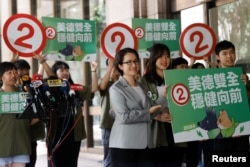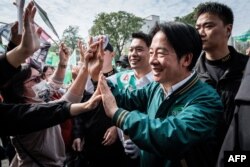Taiwanese voters will head to the polls Saturday to choose their next president.
The stakes in Taiwan's election are high, given that Beijing sees the self-ruling island as a breakaway province and has vowed to take it back — by force, if necessary.
Taiwan's ruling Democratic Progressive Party, or DPP, embraces a more independent stance, and its supporters tend to believe in U.S. willingness to assist Taiwan.
The opposition Kuomingtang party, or KMT, favors greater engagement with China. Its supporters are more likely to question the trustworthiness of the U.S.
There's also the Taiwan People's Party. Founded in 2019, its supporters are mostly young voters who distrust the two major parties.
The Taiwanese government has accused China of interfering in the election campaign to boost the chances of opposition candidates who favor closer ties with Beijing.
Observers back Taipei's accusations, with reports that China has mounted a massive hybrid warfare campaign that includes ramping up military activity, imposing trade sanctions, and running a mammoth disinformation operation online.
Yimeilun or US skepticism
One of the most aggressive and persistent narratives of Chinese propaganda and disinformation in Taiwan has its own nickname — "Yimeilun" or "U.S. skepticism." This negative impact campaign is designed to convince Taiwanese that the United States is an untrustworthy and unreliable partner and is unstable domestically.
The "Yimeilun" campaign often exploits and amplifies such topics as the U.S. withdrawal from Afghanistan and the possible waning of U.S. support for Ukraine.
The opposite, positive impact campaign, portrays the PRC as the Taiwanese people's "real family." Chinese state media and officials often use terms such as "two shores one dear family" (两岸一家亲), "blood thicker than water" (血浓于水), "same root same origin" (同根同源), and "same language same ethnicity" (同文同种).
Beijing has publicly expressed support for the KMT candidate and is using the "Yimeilun" campaign to boost his chances.
In December, China's state media repeatedlyquestioned why the U.S. sells arms to Taiwan, saying it only benefits the U.S. and heightens the risk of conflict in the region.
On Tuesday, state media CCTV accused Washington of "interfering in Taiwan leadership election" by passing an annual defense bill with a commitment to sell arms to Taiwan.
This past summer, Polygraph.info debunked a claim by China's state-owned Global Times newspaper accusing the U.S. of selling outdated and overpriced weapons to Taiwan.
As U.S. pork exports to Taiwan continue to trend higher, an old claim has resurfaced in Chinese state media — that Taiwan's ruling Democratic Progressive Party aims to import poisonous U.S. pork by further lifting the ban on imports of U.S. pork that contains the feed additive ractopamine.
In late 2023, Chinese netizens accused DPP vice presidential candidate Hsiao Bi-khim of being a U.S. pawn, claiming she is "a U.S. citizen" and "unable to speak Mandarin."
In fact, Hsiao, born to an American mother and a Taiwanese father, speaks fluent Mandarin. She used to hold both U.S. and Taiwanese passports but renounced her U.S. citizenship in 2002 after becoming a DPP legislator.
China's anti-American propaganda efforts seem to be bearing fruit: a poll conducted in 2023 by the Taiwanese research institute Academia Sinica found that only 33.9% of Taiwanese considered the U.S. trustworthy, a significant decrease from 45.3% in 2021.
Puma Shen, an associate professor at National Taipei University with a research focus on Chinese Communist Party influence operations, told the BBC that China's "Yimeilun" campaign targeting Taiwan is "a battle for public opinion."
"To persuade everyone that China is the better country is more difficult, but to persuade everyone that America is problematic is relatively easier … to China that would be considered a success," she said.
Shen is also a DPP legislature nominee.
According to a report by the Taiwan Information Environment Research Center (IORG), a Taiwanese civil society organization, 84 different "U.S. skepticism" narratives circulated in Taiwan's media environment in 2021-2023.
Artificial intelligence
The increasing use of Artificial Intelligence (AI) makes China's influence campaigns more sophisticated and difficult to detect.
In November, thousands of netizens in Taiwan shared a deepfake video of the front-runner in the upcoming election, DPP candidate Lai Ching-te, ostensibly admitting that the opposition, not his party, represents the views of a majority of Taiwanese. The Chinese authorities brand Lai as "separatist" and aim their propaganda efforts to undermine his candidacy.
Also in November, a viral video ad featuring Taiwan's President Tsai Ing-wen, who aligns with the DPP, showed her promoting cryptocurrency investments. Taiwan's Criminal Investigation Bureausaid the ad was a deepfake created with generative AI. The language involved in the clip is common in China but rarely used in Taiwan, it said.
In mid-December, Internet research firm Graphika identified a network of more than 800 fake accounts on Facebook that promoted the opposition KMT candidate and slammed his DPP opponent. The accounts closely tracked Taiwan's news cycle and leveraged social issues to portray the DPP as incompetent and corrupt.
On Tuesday, Taiwan's National Security Bureau (NSB) exposed a wave of short video clips that used Mandarin-speaking AI hosts to spread rumors and false information about Ing-wen. The AI-administered accounts shared the clips at the superhuman speed of about 100 times per minute and posted them on YouTube, Instagram, X and other platforms.
Ethan Tu, founder of Taiwan AI Labs, a Taiwanese company, told VOA that the task of identifying fake Chinese accounts is becoming increasingly difficult because of their use of generative AI.
"Generative AI is helping to amplify the impact of information manipulation," he said.
In a quarterly report examining China's disinformation efforts targeting Taiwan, Taiwan AI Labs identified several troll groups on Facebook that echo PRC state-affiliated media narratives. These accounts engaged with all Taiwanese presidential candidates' social media activities, embedding narratives that undermine the DPP candidate and promote his KMT opponent.
VOA reporter William Yang contributed to this disinformation analysis.







